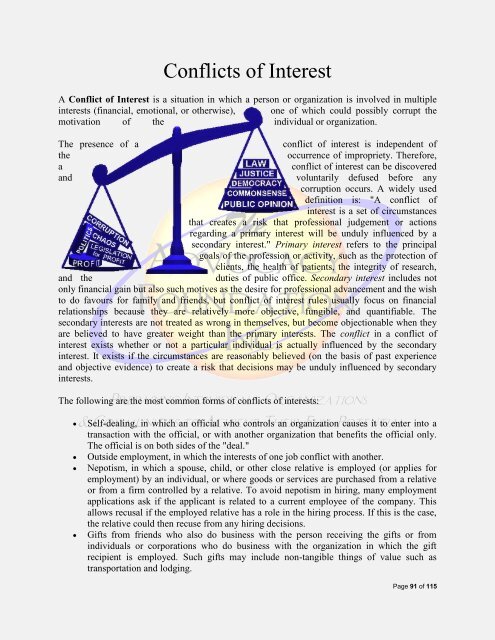Judicial ReEngineering
Judicial ReEngineering
Judicial ReEngineering
You also want an ePaper? Increase the reach of your titles
YUMPU automatically turns print PDFs into web optimized ePapers that Google loves.
Conflicts of Interest<br />
A Conflict of Interest is a situation in which a person or organization is involved in multiple<br />
interests (financial, emotional, or otherwise), one of which could possibly corrupt the<br />
motivation of the individual or organization.<br />
The presence of a<br />
conflict of interest is independent of<br />
the<br />
occurrence of impropriety. Therefore,<br />
a<br />
conflict of interest can be discovered<br />
and voluntarily defused before any<br />
corruption occurs. A widely used<br />
definition is: "A conflict of<br />
interest is a set of circumstances<br />
that creates a risk that professional judgement or actions<br />
regarding a primary interest will be unduly influenced by a<br />
secondary interest." Primary interest refers to the principal<br />
goals of the profession or activity, such as the protection of<br />
clients, the health of patients, the integrity of research,<br />
and the<br />
duties of public office. Secondary interest includes not<br />
only financial gain but also such motives as the desire for professional advancement and the wish<br />
to do favours for family and friends, but conflict of interest rules usually focus on financial<br />
relationships because they are relatively more objective, fungible, and quantifiable. The<br />
secondary interests are not treated as wrong in themselves, but become objectionable when they<br />
are believed to have greater weight than the primary interests. The conflict in a conflict of<br />
interest exists whether or not a particular individual is actually influenced by the secondary<br />
interest. It exists if the circumstances are reasonably believed (on the basis of past experience<br />
and objective evidence) to create a risk that decisions may be unduly influenced by secondary<br />
interests.<br />
The following are the most common forms of conflicts of interests:<br />
<br />
<br />
<br />
<br />
Self-dealing, in which an official who controls an organization causes it to enter into a<br />
transaction with the official, or with another organization that benefits the official only.<br />
The official is on both sides of the "deal."<br />
Outside employment, in which the interests of one job conflict with another.<br />
Nepotism, in which a spouse, child, or other close relative is employed (or applies for<br />
employment) by an individual, or where goods or services are purchased from a relative<br />
or from a firm controlled by a relative. To avoid nepotism in hiring, many employment<br />
applications ask if the applicant is related to a current employee of the company. This<br />
allows recusal if the employed relative has a role in the hiring process. If this is the case,<br />
the relative could then recuse from any hiring decisions.<br />
Gifts from friends who also do business with the person receiving the gifts or from<br />
individuals or corporations who do business with the organization in which the gift<br />
recipient is employed. Such gifts may include non-tangible things of value such as<br />
transportation and lodging.<br />
Page 91 of 115

















